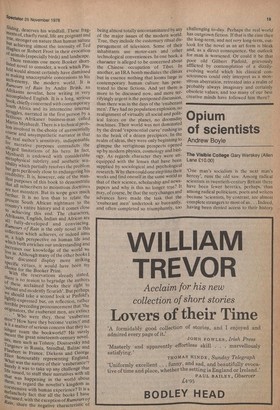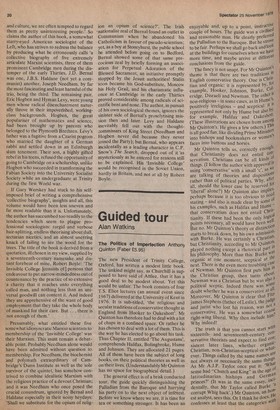Opium of scientists
Andrew Boyle
The Visible College Gary Werskey (Allen Lane 210.00) 'One man's socialism is the next man's heresy', runs the old saw. Among radical scientists in twentieth-century Britain there have been fewer heretics, perhaps, than among radical politicians, poets and writers because 'scientists, by contrast, are almost complete strangers to most of us. . . Indeed, having been denied access to their history and culture, we are often tempted to regard them as pretty uninteresting people.' So claims the author of this book, a somewhat starry-eyed American sociologist of the Left, who has striven to redress the balance by producing what he erroneously calls 'a collective biography of five extremely articulate Marxist scientists, three of them prominent Cambridge men during the distemper of the early Thirties, J.D. Bernal was one, J.B.S. Haldane (not yet a communist) another, Joseph Needham, by far the most fascinating and least harmful of the trio, being the third. The remaining pair, Eric Hogben and Hyman Levy, were young men whose radical disenchantment naturally throve in their impoverished, workingclass backgrounds. Hogben, the great populariser of mathematics and science, had been brought up by parents who belonged to the Plymouth Brethren. Levy's father was a fugitive from a Czarist pogrom who married the daughter of a German rabbi and settled down in an Edinburgh slum tenement. Their son, a highly gifted rebel in his teens, refused the opportunity of going to Cambridge on a scholarship, unlike Hogben who succeeded in transforming the Fabian Society into the University Socialist Society while an undergraduate at Trinity during the first World war.
If Gary Werskey had stuck to his selfimposed brief of writing a comprehensive 'collective biography', insights and all, this volume would have been less uneven and far more readable than it is. Unfortunately, the author has succumbed too readily to the tendencies which seem to plague professional sociologists: turgid and verbose hair-splitting, endless theorising about dull, sectarian niceties, and an almost unerring knack of failing to see the wood for the trees. The title of the book is derived from a quotation, ill chosen in my view, supplied by a seventeenth-century namesake and distant forebear of mine, Robert Boyle: The Invisible College [consists of] persons that endeavour to put narrow-mindedness out of countenance by the practice of so extensive a charity that it reaches unto everything called man, and nothing less than an universal goodwill can content it. And indeed they are apprehensive of the want of good employment that they take the whole body of mankind for their care. But . . . there is not enough of them.'
Presumably, what entitled these five somewhat idiosyncratic Marxist scientists to membership of the 'Invisible College' was their Marxism. This must remain a debatable point. Probably Needham alone would have been admitted without question to membership. For Needham, the biochemist and polymath extraordinary of Cambridge's Dunn Institute as well as the sole survivor of the quintet, has somehow contrived to combine idealistic Marxism with the religious practice of a devout Christian; and it was Needham who once posed the crucial conundrum, ignored by Bernal and Haldane especially in their noisy heydays: 'Shall we substitute for the opium of relig ion an opium of science?'. The Irish 'nationalist zeal of Bernal found an outlet in Communism when he abandoned his Catholicism in favour of pseudo-scientism; yet, as a boy at Stoneyhurst, the public school he attended before going on to Bedford, Bernal showed some of that same precocious zeal by briefly forming an association for Perpetual Adoration of the Blessed Sacrament, an initiative promptly stopped by the Jesuit authorities! Stalin soon became his God-substitute, Moscow his Holy Grail, and his charismatic influence at Cambridge in the early Thirties proved considerable among radicals of scientific bent and none. The author, in pursuit of his own sociological themes, ignores the sinister side of Bernal's proselytising mission then and later. Levy and Haldane inevitably fell out with the thoughtwmmissars of King Street (Needham and Hogben never did because they never joined the Party); but Bernal, who appears incidentally as a leading character in C.P. Snow's The Search, dropped out of it 'as mysteriously as he entered for reasons still to be explained. His 'Invisible College' would be recognised in the Soviet Union, hardly in Britain, and not at all by Robert Boyle.



































 Previous page
Previous page